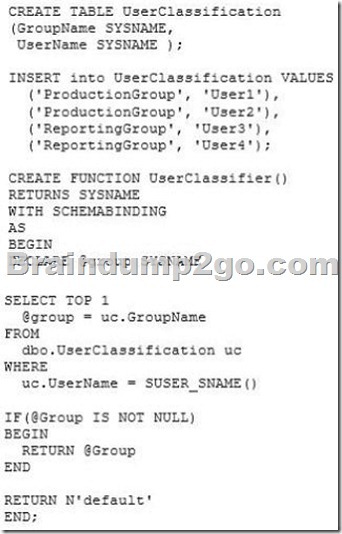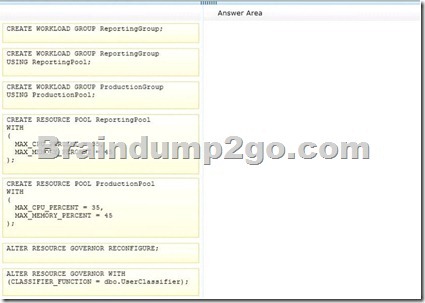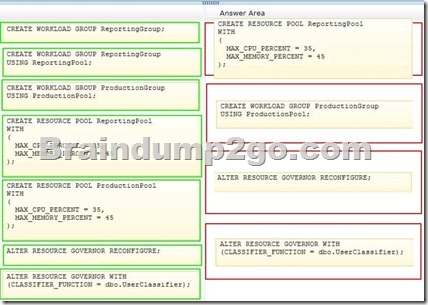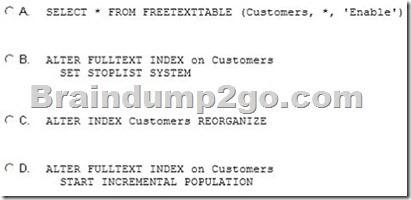Free Latest Exam Microsoft 70-432 Preparation Materials From Braindump2go (181-190)
Microsoft Official Exam Center New Released 70-432 Dumps Questions, Many New Questions added into it! Braindump2go Offer Free Sample Questions and Answers for Download Now! Visit Our Webiste, get the new updated Questions then pass Microsoft 70-432 at the first try!
Vendor: Microsoft
Exam Code: 70-432
Exam Name: TS: Microsoft SQL Server 2008, Implementation and Maintenance
Keywords: 70-432 Exam Dumps,70-432 Practice Tests,70-432 Practice Exams,70-432 Exam Questions,70-432 PDF,70-432 VCE Free,70-432 Book,70-432 E-Book,70-432 Study Guide,70-432 Braindump,70-432 Prep Guide

QUESTION 181
You maintain a SQL Server 2008 instance.
You use SQL Server Database Mail to distribute multiple reports that are scheduled and generated every night.
You need to enforce a mail retention policy to delete copies of automatically generated mails
after 60 days.
Which process should you use?
A. Set the Subscription retention interval to delete mails after 60 days.
B. Set the MailProfile property of a Management Policy on the Server facet to delete mails
after 60 days.
C. Create a SQL Agent job to use the sysmail_delete_log_sp stored procedure to delete mails
older than 60 days.
D. Create a SQL Agent job to use the sysmail_delete_mailitems_sp stored procedure to delete
mails older than 60 days.
Answer: D
QUESTION 182
Drag and Drop Question
You administer a Microsoft SQL Server 2008 database for an order-processing application.
The following Transact-SQL statements have been run against the database:

You need to ensure that members of the reporting group can use only up to 35 percent of the CPU and up to 45 percent of the available RAM.
Which four Transact-SQL statements should you use? (To answer, move the appropriate SQL statements from the list of statements to the answer area and arrange them in the correct order.)

Answer:

QUESTION 183
You troubleshoot a SQL Server 2008 instance.
You suspect that an application uses an inefficient locking strategy and causes concurrency problems.
You need to identify the following:
– The sessions that wait for a resource
– The resource needed
– The sessions that block the resource
Which dynamic management view should you use?
A. sys.dm_os_waiting_tasks
B. sys.dm_os_wait_stats
C. sys.dm_tran_active_transactions
D. sys.dm_exec_requests
Answer: A
QUESTION 184
You administer a SQL Server 2008 instance that contains a very large database named FinanceDB.
You plan to create a maintenance plan that meets the following objectives for the FinanceDB database:
– It executes the DBCC CHECKDB statement.
– It rebuilds all the indexes.
– It updates all index statistics.
You need to ensure that the maintenance plan is executed in the minimum amount of time.
Which two actions should you perform? (Each correct answer presents part of the solution.
Choose two.)
A. Use the Reorganize Index task.
B. Use the Update Statistics task.
C. Use the Shrink Database task.
D. Use the Check Database Integrity task.
E. Use the Rebuild index task.
Answer: AE
QUESTION 185
You design a maintenance plan for a SQL Server 2008 instance that contains a database named SalesDB.
The SalesDB database includes spatial indexes to support queries on spatial data.
You need to perform physical consistency checks on SalesDB.
You also need to ensure that the performance effect on the SalesDB database is minimized.
Which Transact-SQL statement should you execute?
A. DBCC SYS_CHECK (SalesDB);
B. DBCC SQLPERF (SalesDB);
C. DBCC RSPAIRDB (SalesDB);
D. DBCC CHECKDB (SalesDB);
Answer: A
QUESTION 186
You administer a SQL Server 2008 instance.
You need to identify the network protocol used by the current connection.
What should you do?
A. View the SQL error log.
B. Use a Dynamic Management View.
C. Set a trace flag.
D. Use the T-SQL template in Profiler.
Answer: B
QUESTION 187
You administer a Microsoft SQL Server 2008 R2 database that hosts an order-processing application.
You need to ensure that the database allows full-text searches on the Customers table.
You also need to ensure that the full-text index is ready for use by the users.
You execute a Transact-SQL statement to create the full-text index on the Customers table by using the CHANGE_TRACKING
OFF and NO POPULATION clauses in the CREATE FULLTEXT INDEX statement.
You execute an ALTER FULLTEXT INDEX.
Which command or commands should you use next?

A. Option A
B. Option B
C. Option C
D. Option D
Answer: D
QUESTION 188
You install a 64-bit version of a SQL Server 2008 instance by using the default setup and configuration settings.
You receive the following error message:
“Your SQL Server installation completed with \a: ures.1
You close the error window before noting the location where additional information about the error is recorded.
You need to locate the additional information.
Where should you search?
A. The Event Viewer Application log file
B. The C:\Program Files\Microsoft SQL Server\100\Setup Bootstrap\Log\ folder
C. The C:\Program Files\Microsoft SQL Server\MSSQL\LOG folder
D. The Event Viewer System log file
Answer: B
QUESTION 189
You administer a SQL Server 2008 instance that contains a database named AdventureWorks.
You plan to use data compression to conserve disk space.
You compress a table named VeryLarge that has a clustered index named Index1 and a non-clustered index named Index2.
Both indexes are partitioned.
You execute the following Transact-SQL statement.
ALTER INDEX Index2 ON VeryLarge REBUILD WITH (DATA_COMPRESSION = ROW);
You need to ensure that all the indexes of the VeryLarge table are compressed by using row-level compression.
You need to accomplish this goal by using minimum resources.
Which Transact-SQL statement should you execute?
A. ALTER INDEX ALL ON VeryLarge REBUILD PARTITION=ALL WITH
(DATA_COMPRESSION = ROW);
B. ALTER INDEX ALL ON VeryLarge REBUILD WITH (DATA_COMPRESSION = ROW);
C. ALTER INDEX Index1 ON VeryLarge REBUILD WITH (DATA_COMPRESSION = ROW);
D. ALTER INDEX Index1 ON VeryLarge REORGANIZE WITH (LOB_ COMPACTION = ON);
Answer: C
QUESTION 190
You administer a SQL Server 2008 instance that contains a database named Sales.
The Sales database contains a table named Customers that has a column named CompanyName.
The current database collation is SQL_Latin1_General_Cp1_CI_AS.
You need to ensure that the indexes which include the CompanyName column are case- sensitive.
You also need to ensure that other case-insensitive queries are unaffected.
What should you do?
A. Use the UPPER function in the filter criteria on all queries that filter on the CompanyName
column.
B. Drop all indexes on the Sales database.Modify the database to specify SQL_Latin1_General_Cp1_CS_AS as the default collation. Rebuild all the indexes.
C. Use the CAST function in the filter criteria on all queries that filter on the CompanyName
column.
D. Drop all indexes on the Customer table that include the CompanyName column in the index
key. Modify the column to specify the SQL_Latin1_General_Cp1_CS_AS collation.
Recreate the CompanyName indexes on the Customer table.
Answer: A
All the 233 Questions and Answers in Braindump2go 70-432 Exam Dumps are the latest 70-432 Real Exam Questions not just 70-432 Practice Tests Questions! Braindump2gp Microsoft 70-432 Exam Dumps PDF&VCE Guarantees you 100% Pass 70-432 Exam! Braindump2go Can Provide the Latest 70-432 Dumps Questions from Microsoft Official Exam Center for You!
